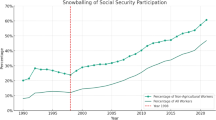Abstract.
The underprovision of public goods and the inefficiency of the migration equilibrium in a federation are widely discussed in the fiscal externality literature. The central authority can solve these problems by using inter-regional transfers. Moreover, it has been shown that an intervention of the central government is not necessary when the individuals are identical with respect to their marginal rate of substitution of private for public goods since local authorities will make efficient transfers to other regions by themselves. This paper, however, shows that an efficient population distribution in a federation is not guaranteed if individuals differ with respect to their marginal benefit from public consumption even if communities make transfers. The paper also demonstrates the importance of the preference revelation by the residence choice.
Similar content being viewed by others
Author information
Authors and Affiliations
Additional information
Received: March 1996 / Accepted in revised form: January 1997
Rights and permissions
About this article
Cite this article
Wrede, M. Local public goods, heterogeneous population, voluntary transfers, and constrained efficient allocations. Ann Reg Sci 31, 217–234 (1997). https://doi.org/10.1007/s001680050046
Issue Date:
DOI: https://doi.org/10.1007/s001680050046




